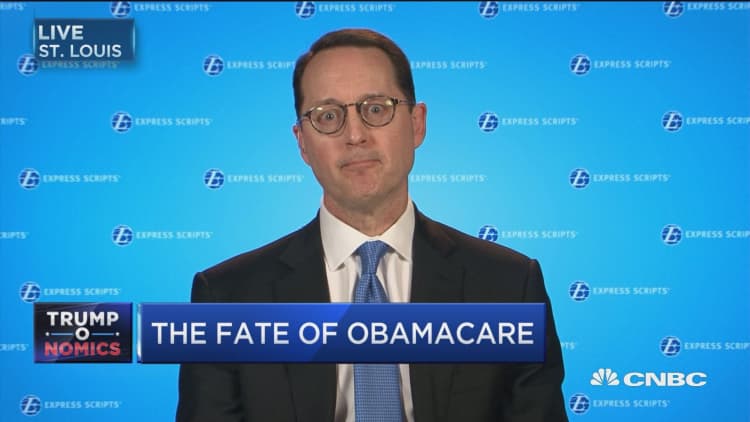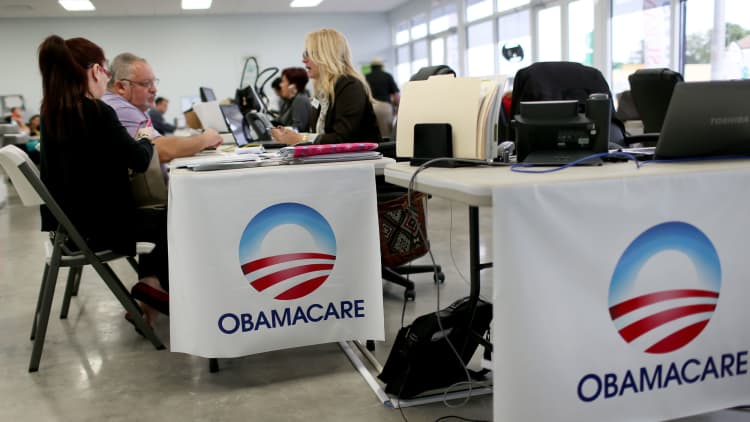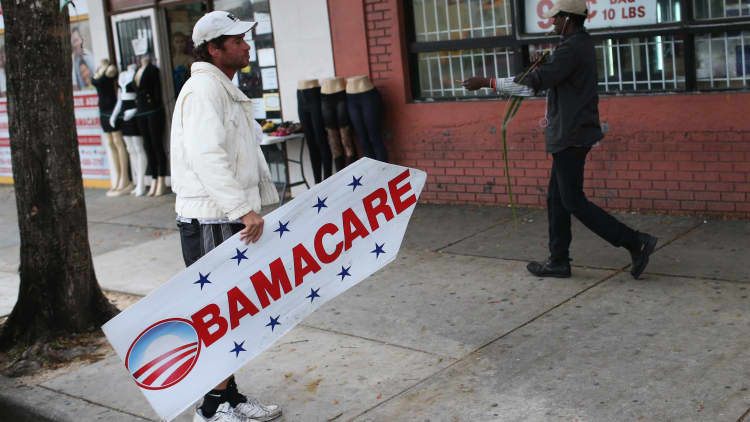Obamacare sign-ups on Minnesota's insurance marketplace sharply spiked upward this year, providing more evidence for the claim that Trump administration actions caused lower enrollment on the federal health exchange.
MNSure, the state-run health exchange for Minnesota, on Thursday reported that 114,810 people signed up for private individual insurance plans sold on that marketplace by the close of enrollment this week.
That tally is more than 34 percent higher than the 85,690 enrollments seen on the exchange last year.

"We are enrolling people at historically high levels," said MNsure CEO Allison O'Toole. "When more Minnesotans are covered, our state is healthier and our economy is stronger."
Minnesota's tally was helped, at least partially, by a one-week extension in the enrollment deadline the exchange granted. That extension was offered in light of the passage of a state law in late January that gave more than 125,000 residents an automatic 25 percent reduction in their insurance plan premiums if they faced significant premium hikes this year.
But even before that extension, MNSure was seeing dramatic growth in sign-ups for 2017 plans.
However, even as the state's Obamacare marketplace gained customers, there was a steep drop in the total number of people covered by the individual insurance market in the state. That market comprises both individual plans bought on MNSure — the only place that qualified low and middle-income customers can get federal subsidies that lower their monthly premiums — and plans bought outside of that exchange.
"Today there are 30 percent fewer Minnesotans buying health insurance on their own than this time last year," the Minnesota Council of Health Plans said Thursday. "While MNsure's announcement today that 114,810 people bought these policies through the state's marketplace, fewer purchased health insurance directly from health plans. Total enrollment is just under 190,000, down from 270,400 in March 2016."
Jim Schowalter, president of the Minnesota Council of Health Plans, said, "MNsure is getting a bigger share of a smaller pie,."
"While it's great that more people are getting help from the federal and state governments to pay their monthly premiums, the fact that so few people have signed up is alarming," Schowalter said. "The bad news is that fewer people will be helping to pay for really high medical bills" incurred by remaining customers, he said.
Sign-ups on the 12 Obamacare insurance exchanges run by states and the District of Columbia now have, as a group, handily beat the performance of the federal exchange HealthCare.gov, which serves residents of 39 states. Seven of the 12 state-based markets reported increases in enrollment compared to last year.
Enrollment on the state exchanges, which now stands at above 3 million, is up about 2.4 percent over last year's tally, according to the leading Obamacare tracking site ACASigups.net. The final tally from Vermont, which has yet to report its results, would add to that, albeit very slightly.

In contrast, the 9.2 million sign-ups on HealthCare.gov reported last week means the federal exchange has seen a more than 5 percent drop in enrollment. That drop takes into account the fact that Kentucky residents began being served there this year.
Because of the drop on HealthCare.gov, national Obamacare enrollment for 2017 health plans is on track to be about 500,000 people lower than were seen at the close of enrollment nationally last year.
Obamacare supporters have blamed the drop in enrollment on HealthCare.gov on a decision by the Trump administration in the final days of open enrollment to cancel advertising and outreach efforts for the exchange.
Those efforts had previously been scheduled by the outgoing Obama administration, which, unlike the Trump team, supported the Affordable Care Act.

The Trump administration rescinded its decision, albeit partially, by allowing tweets and email reminders related to HealthCare.gov to go out.
But Obamacare supporters also have said that lower HealthCare.gov sign-ups could reflect perceptions about an executive order President Donald Trump signed on Jan. 20, his first day in office, that authorized federal officials to scale back "economic and regulatory burdens" from the ACA.
That order was seen as potentially authorizing a suspension of the Obamacare requirement that most Americans have some form of health coverage or pay a tax penalty. No such suspension has happened, however.
The more than 7 percent performance gap between HealthCare.gov's performance this year and that of the state-based marketplaces, suggest that the ad and outreach pullback, as well as possibly Trump's order, had a decisive effect. Unlike HealthCare.gov, the state-run exchanges continued their advertising and outreach through the end of open enrollment.


